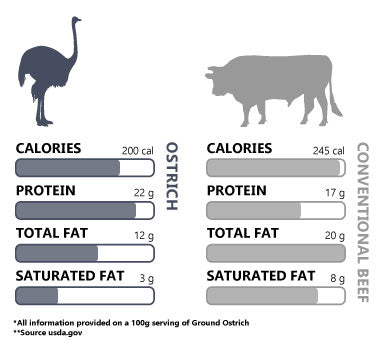
Ostrich are natives of Africa, where they thrived for tens of thousands of years across the continent's deserts and savannas. From prehistoric through ancient times, humans have hunted Ostrich for their meat, eggs, and feathers. Ostrich eggs have thick shells so after the egg was eaten, the shell was commonly used as a light-weight water vessel by sub-Saharan people, while their feathers adorned the headdresses and fans of ancient Egyptians.
During the Bronze Age, Ostrich were held in captivity by wealthy families from Babylon, Egypt, Nineveh, Greece, and Rome for their menagerie gardens. It was only about 150 years ago that Ostrich were first domesticated. Farmers in South Africa embarked on this endeavor to supply the demand for Ostrich feathers, which peaked during the Victorian Era to decorate the hats, jackets, and dresses of Europeans. However, after World War I, Ostrich feathers were no longer in fashion, resulting in many farmers pulling out of the industry.
Today, the Ostrich industry is on the rise as more environmental and health-conscious consumers are seeking alternatives to conventionally raised meat, which you will learn as you read on, makes Ostrich a leader in the field.
On Sustainability:
The numbers speak for themselves when comparing the resources it requires to raise Ostrich compared to Grassfed Beef:
> 1/50 of land
> 1/3 of water
> 3 times less feed
> 1/10 greenhouse gases emitted per pound
On Nutrition:
Not only is Ostrich more environmentally sustainable than other red meats, but its nutritional content makes it a considerably healthy red meat alternative as well.
Ostrich is 99% fat free, offering more protein and less calories per serving than Beef provides. It also contains a greater amount of essential micronutrients, including vitamin B12, iron, manganese, phosphorus, potassium, and selenium.

Fossil Farms' Ostrich:
Ostrich meat was the original inspiration and product line for brothers Lance and Todd Appelbaum, fueling the creation of Fossil Farms! Todd Appelbaum, owner and operator of Roaming Acres Farm, located in Sussex County, New Jersey, has been raising Ostrich and other livestock for over a quarter-century. Working together with Lance Appelbaum, the owner of Fossil Farms, the brothers set out to change the eating habits of the American diet.
Fossil Farms procures Ostrich from our own family farm in New Jersey, as well as other family-owned farms through the United States and as far as Australia. No matter which farm our Ostrich comes from, we ensure they are raised to the specifications of our "Never Ever Program,” where antibiotics, steroids, and hormones are never administered to the animal, making them a 100% all natural product.
Fun Facts:
> Ostrich is the world's largest bird. Though they cannot fly, Ostrich can run up to 40 mph!
> The Egyptian goddess Ma'at, who personifies cosmic balance, morality, and justice, is often depicted with an Ostrich feather, representing truth.
> Fossil Farms' Ostrich eggs made their Hollywood debut in Jurassic Park III, released in 2001.



